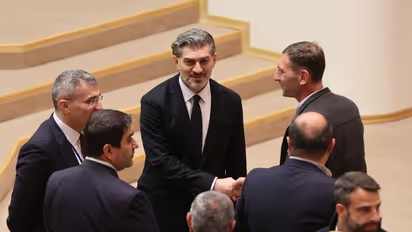Former Manchester City star Mikheil Kavelashvili elected President of Georgia in a blow to its EU aspirations

Synopsis
Mikheil Kavelashvili, a former football player and member of the Georgian Dream party, was elected president of Georgia on Saturday, marking a significant political shift in the South Caucasus nation.
Mikheil Kavelashvili, a former football player and member of the Georgian Dream party, was elected president of Georgia on Saturday, marking a significant political shift in the South Caucasus nation. The 53-year-old won the election with ease, securing the backing of the ruling Georgian Dream party, which controls a 300-seat electoral college that replaced direct presidential elections in 2017.
Kavelashvili's victory has been met with fierce opposition, with critics accusing the ruling party of consolidating power and steering Georgia closer to Russia. The opposition, which has been vocal in its condemnation of Georgian Dream’s policies, claims the election was heavily influenced by Moscow. In the October 26 parliamentary elections, which the opposition alleges were rigged, Georgian Dream maintained its hold on parliament. The opposition has since boycotted parliamentary sessions and demanded a rerun of the vote.
The newly elected president's tenure comes at a time of escalating tensions between Georgia and the European Union. The Georgian Dream party has pledged to continue its push for EU membership, but also seeks to "reset" ties with Russia, a country with which Georgia fought a brief war in 2008. That conflict led to Russia’s recognition of two breakaway Georgian regions as independent and an increased military presence in South Ossetia and Abkhazia.
The shift towards closer ties with Russia, however, has sparked outrage among pro-Western groups in Georgia. Critics of Georgian Dream, including the outgoing president Salome Zourabichvili, argue that the party’s increasingly authoritarian stance and its alignment with Moscow threaten Georgia’s pro-European aspirations. Zourabichvili, who has served as president since 2018, has vowed to remain in office despite the end of her term on Monday. She claims that the current parliament is illegitimate, and she continues to see herself as the country's rightful leader until new elections are held.
Born in France to Georgian parents, Zourabichvili had a distinguished career with the French Foreign Ministry before serving as Georgia's foreign minister under President Mikheil Saakashvili in 2004. Although elected president with the support of Georgian Dream, she later became a vocal critic of the ruling party, accusing it of moving Georgia closer to Russia. She also faced an unsuccessful impeachment attempt by Georgian Dream in 2019.
In a defiant statement on social media, Zourabichvili declared, "I remain your president — there is no legitimate Parliament and thus no legitimate election or inauguration." She emphasized that the opposition is not calling for revolution, but for a fair electoral process that reflects the true will of the Georgian people.
Meanwhile, Kavelashvili's rise to the presidency has been controversial. Before entering politics, he played as a striker in the Premier League for Manchester City and in several clubs in the Swiss Super League. He was elected to Georgia's parliament in 2016 and co-founded the People's Power political movement in 2022, which has aligned itself with Georgian Dream and adopted strong anti-Western rhetoric.
Kavelashvili was instrumental in the passage of a controversial law that requires organizations receiving more than 20 percent of their funding from abroad to register as pursuing the interests of a foreign power. The law, which mirrors a similar Russian law used to target dissent, has been widely criticized by Western governments. In response to Georgia’s approval of this law, the EU suspended talks on Georgia’s accession to the bloc and cut financial support.
As Kavelashvili assumes the presidency, protests have continued to grow across Georgia. Thousands of demonstrators have gathered outside the parliament building in Tbilisi since the government suspended talks on EU accession in late November. The protests have been met with heavy police repression, including the use of water cannons and tear gas to disperse crowds. Hundreds have been detained, and dozens have been injured, including several journalists.
The EU and the United States have condemned the crackdown, with officials calling for restraint and urging the Georgian government to respect the rights of its citizens to peacefully protest. As the political crisis deepens, Georgia’s future direction remains uncertain, with tensions between pro-Western forces, the ruling party, and Russia at the forefront of the nation’s struggle for identity and sovereignty.
Check the Breaking News Today and Latest News from across India and around the world. Stay updated with the latest World News and global developments from politics to economy and current affairs. Get in-depth coverage of China News, Europe News, Pakistan News, and South Asia News, along with top headlines from the UK and US. Follow expert analysis, international trends, and breaking updates from around the globe. Download the Asianet News Official App from the Android Play Store and iPhone App Store for accurate and timely news updates anytime, anywhere.